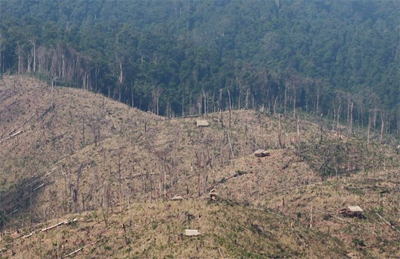Vietnam outsources deforestation to neighboring countries
In conserving its forests while its growing export-oriented wood products industry, Vietnam outsources deforestation to Laos, Cambodia, and China. 
By Rhett A. Butler, mongabay.com Taking a cue from its much larger neighbor to the north, Vietnam has outsourced deforestation to neighboring countries, according to a new study that quantified the amount of displacement resulting from restrictions on domestic logging. Like China, Vietnam has experienced a resurgence in forest cover over the past twenty years, largely as a result a forestry policies that restricted timber harvesting and encouraged the development of processing industries that turned raw log imports into finished products for export. These measures contributed to a 55 percent of Vietnam’s forests between 1992 and 2005, while bolstering the country’s stunning economic growth. But the environmental benefit of the increase in Vietnam’s forest cover is deceptive: it came at the expense of forests in Laos, Cambodia, and Indonesia. Authors Patrick Meyfroidt and Eric F. Lambin of the Universite Catholique de Louvain in Belgium calculate that 39 percent of Vietnam’s forest regrowth between 1987 and 2006 was effectively logged in other countries. Half of the wood imports into Vietnam were illegal. “Vietnam protected its forests and developed its economy by exporting its deforestation to neighboring countries,” the authors write, noting that the apparent “leakage” — an increase in deforestation in one region caused by reduction of deforestation in another — is “a major challenge in policies aimed at protecting forests and mitigating carbon emissions”. …
Vietnam outsources deforestation to neighboring countries